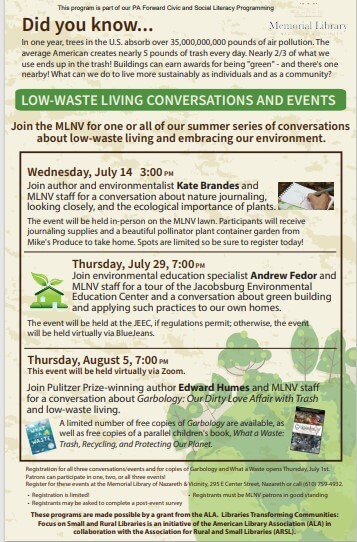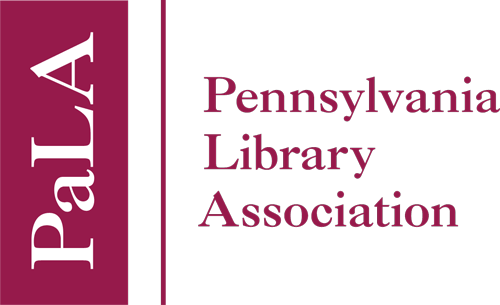Nature Journaling: Low-Waste Living Conversations and Events
| Posted By Jill Silvius, Memorial Library of Nazareth and Vicinity, 610-759-4832, jsilvius@nazarethlibrary.org, Thursday, September 15, 2022 |
|
Library Type Public Description: On Wednesday, July 14, 2021 at 3 PM on the lawn of the Memorial Library of Nazareth and Vicinity, patrons of all ages gathered for guidance by author/artist/environmentalist Kate Brandes. We conversed about various ways to nature journal: writing, drawing, leaf-rubbing, etc.. As we perched by one of the library’s partially landscaped patches, Brandes passed milkweed pods and plants around, and she taught everyone about milkweed’s history and the ecological importance of native plants. She showed examples before we tried it on our own; with library-supplied journals and colored pencils, patrons explored the library grounds, which contain a number of non-native tree and flower species. Finally, and most significantly, we regathered to discuss the experience: what we observed, what we felt, and what we discovered. We explored questions like “What can nature teach us? How do you think nature journaling and ‘looking closely’ relate to sustainability and living as ‘low-waste’ as possible? What ideas from today most resonated with you?” Attendees then got to take home a beautiful pollinator plant container garden.
The event was the first in a three-part special series of “low-waste living” events. For the second, patrons joined environmental education specialist Andrew Fedor for a tour of Jacobsburg Environmental Education Center and a conversation about green building and applying such practices to our own homes. For the third, participants joined Pulitzer Prize-winning author Edward Humes for an online conversation about his book Garbology: Our Dirty Love Affair with Trash.
The MLNV had multiple goals for the proposed project: engagement: Community members had multiple opportunities to ask questions, share ideas and information, better articulate problems, and evaluate alternatives, while brainstorming collaboratively about ways to “look closely” at nature, value ecology, live more responsibly, and produce less trash! We wrote, drew pictures, talked with each other, asked questions, provided insights, and built community spirit. empowerment: We learned methods to better ourselves, our community, and our world. We explored action steps we can take to live more waste-free, outside, inside, in our homes, in our personal choices as consumers, etc. enrichment: Our discussions gave us knowledge about nature journaling, looking closely, ecology, pollinator plants, "green building," trash management, and low-waste living and ways to adopt it. establishment of community partnerships: The conversation series allowed us to further strengthen our community bonds with the Jacobsburg Environmental Education Center, a local environmentally-focused organization, as well as members of our larger community (Kate Brandes, Edward Humes) and, of course, with each other. envisioning: We have established the groundwork for future environmentally- conscious decisions; perhaps we can create further partnerships that are environmentally-sound. The MLNV marketed the program via printed ads in the local Nazareth Key newspaper, as well as on social media, the library's website, printed posters, and via its monthly emailed newsletter. The program cost about $750, for pay for Brandes, twenty container gardens, colored pencils and sketchpads, and ads. The funding was generously provided by a grant from the ALA (American Library Association: Libraries Transforming Communities). Participants completed a survey after the conversation, expressing what they enjoyed about it; what they learned from it regarding themselves, their community, and the topic of sustainability; what aspect/s of their lives will change in regards to “low-waste living” as a result of the conversation; and what they discovered about their community. Responses were primarily positive, with participants saying, “I learned lots of new things, and this helped me connect with other people who share my interests,” “It sparked an interest for me in something that seems so ordinary but is actually very complex,” and “[it] made me stop & think more about nature.” PA Forward says of Civic and Social Literacy, “Engaging in discourse while remaining respectful of other individuals of varying opinions; understanding the importance of community engagement which allows individuals to interact with one another, in a participatory manner; invoking societal change.” The program supports such literacy in that participants shared considerately with each other and openly discussed the need for our community to band together for more sustainable ecological living. The program impacted Diversity, Equity, and Inclusion in that it was marketed to ALL community members and for ALL ages. Happily, it drew community members of different ages, comfort levels in sharing, and ability levels in drawing (though Brandes assured us that artistic ability is not a prerequisite for nature journaling)! The program reminded participants that we are all citizens of one earth, and we are responsible for cherishing it as best we can. |

